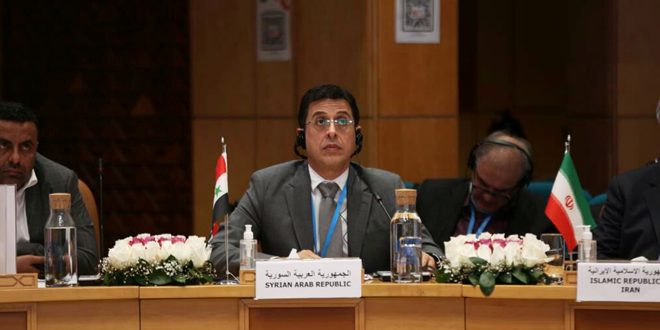Syria and all member states of the World Health Organization are facing various health risks and emergencies, with different political, economic, social and health impacts and repercussions”, Health Minister Dr. Hassan al-Ghabbash, said on Wednesday.
Ghabbash stressed in his statement on emergency response presented during the 69th session of the WHO Regional Committee for the Eastern Mediterranean held in Cairo ” the importance of the essential and basic commitments adopted by the WHO within the International Health Regulations 2005 and its role in responding to emergencies, and in supporting member countries in preparing, responding and recovering.”
Read Also: Syria Calls for Support to Counter Sanctions on Health Sector
Ghabash pointed out that “Syria is accelerating the pace of work towards early recovery from the war that has lasted more than ten years, which coincided with the Covid-19 pandemic”.
He reiterated Syria’s support for WHO’s efforts and its committees to reach an effective consensual model for emergency response.
The 69th session of the WHO Regional Committee for the Eastern Mediterranean kicked off in Cairo on Tuesday under the slogan “Together for a sustainable tomorrow and better health” and continues until the 13th of this month.
Pro-government al-Watan reports on Cholera Spread
The United Nations has warned that Syria will witness one of its harshest winters this year, due to the lack of fuel and electricity. The UN stressed Syria’s “urgent need” for about $200 million to fill the funding gap and meet Syrians’ needs for winter between October and March 2023.
“Some six million people will need humanitarian assistance to cope with the harsh winter conditions, an increase of 33 percent compared to last year,” said UN spokesman Stephane Dujarric.
“This year’s winter response strategy focuses on helping the most vulnerable, including those living in remote, high-altitude and highly vulnerable conditions. The latter includes at-risk demographics such as children, the elderly, pregnant women, people with disabilities, and people with chronic medical conditions,” Dujarric added.
“Among those who have been prioritized for assistance are displaced people living in tents or temporary shelters, including 800,000 people staying in tents in northwestern Syria, in areas controlled by terrorist organizations,” Dujarric said.
Dujarric said that the Syria Humanitarian Response Plan for 2022 suffers from a severe lack of funding. He explained that there is an urgent need for about $200 million to fill the funding gap.
This article was edited by The Syrian Observer. The Syrian Observer has not verified the content of this story. Responsibility for the information and views set out in this article lies entirely with the author.


